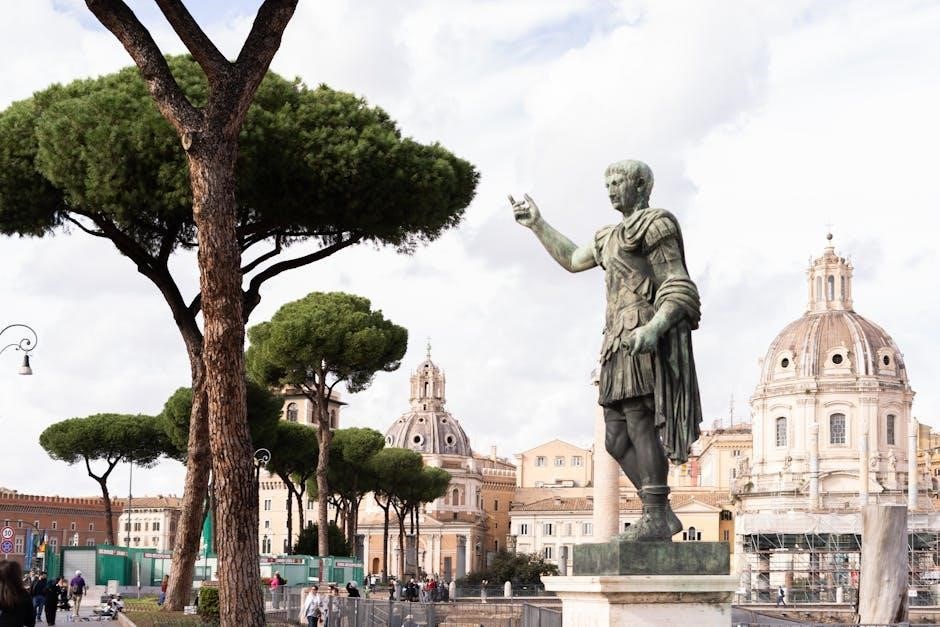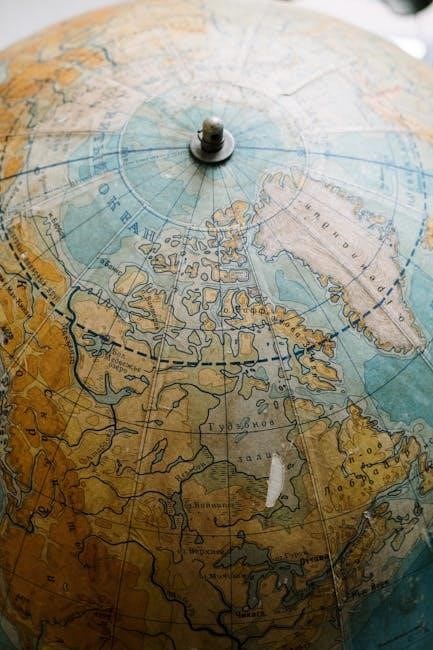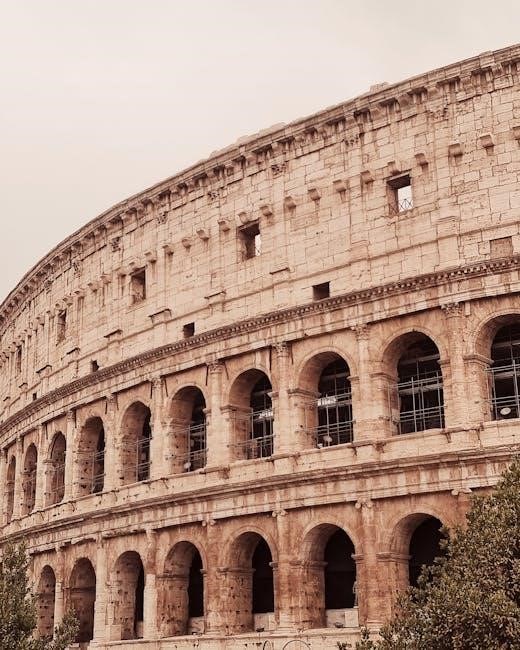The World History Shorts 2 Answer Key provides comprehensive solutions for 30 one-page historical stories, activity sheets, and quizzes. It aids students and educators in verifying answers accurately, ensuring a deeper understanding of key historical events and concepts. This resource is ideal for reinforcing learning and preparing for assessments.
1.1 Overview of the Document
The World History Shorts 2 Answer Key is a structured resource containing 30 one-page historical narratives, activity sheets, and quizzes. It provides correct answers for multiple-choice questions, crosswords, and other exercises, ensuring accurate verification of student responses. The document is organized chronologically, covering key events from ancient civilizations to modern times, making it an essential tool for historical learning and assessment preparation.
1.2 Importance of Answer Keys in Historical Studies
Answer keys are vital for historical studies as they provide clarity and accuracy in assessing student understanding. They offer immediate feedback, helping learners identify strengths and weaknesses. By verifying responses, answer keys ensure concept mastery and foster critical thinking. They also serve as a reliable reference for educators, streamlining grading and enhancing the overall learning experience in world history education.

Key Historical Periods Covered
This section explores major historical periods, including Ancient Civilizations, the French Revolution, and the Age of Reason, providing insights into their significance and global impact.
2.1 Ancient Civilizations
The World History Shorts 2 Answer Key covers the rise and contributions of Ancient Civilizations, such as Mesopotamia, Egypt, and China. It provides answers to questions about their cultural, technological, and societal advancements, helping students understand the foundational aspects of early human history and its lasting influence on modern societies.
2.2 The French Revolution
The World History Shorts 2 Answer Key addresses the French Revolution, detailing its causes, key events, and consequences. It covers the financial crisis, social inequality, and the execution of King Louis XVI. The document also highlights the Reign of Terror and the rise of Napoleon, emphasizing the revolution’s impact on modern democracy and its role in shaping European history.
Major Historical Events
The World History Shorts 2 Answer Key covers pivotal events like the French Revolution and the Boxer Rebellion, providing insights into their causes, impacts, and historical significance.
3.1 The Execution of a King
The execution of King Charles I in 1649 marked a significant turning point in English history, ending absolute monarchy and establishing parliamentary supremacy. This event, covered in the World History Shorts 2 Answer Key, highlights the conflict between royal authority and political reform, shaping modern governance structures and influencing revolutionary movements across Europe and beyond.
3.2 The Boxer Rebellion
The Boxer Rebellion, occurring in early 20th-century China, was an anti-foreigner uprising targeting foreign influence and Christian missionaries. The World History Shorts 2 Answer Key details how the Boxer Protocol ended the conflict, leading to significant political and social changes in China, including the weakening of the Qing Dynasty and increased foreign domination, reshaping the nation’s trajectory in global affairs.

Activity Sheets and Quizzes
World History Shorts 2 includes engaging activity sheets and quizzes to reinforce learning. Multiple-choice questions and crossword puzzles help students grasp key historical concepts effectively.
4.1 Multiple Choice Questions
The multiple-choice questions in World History Shorts 2 are designed to assess understanding of key historical events and concepts. Each question focuses on specific details from the stories, ensuring students can apply their knowledge effectively. The answer key provides correct responses, allowing learners to verify their answers and identify areas for further study. This format reinforces learning and prepares students for standardized assessments.
4.2 Crossword Puzzles
The crossword puzzles in World History Shorts 2 are engaging activities that reinforce historical knowledge. Each puzzle focuses on key terms and concepts from the stories, helping students build vocabulary and understanding. The answer key provides correct solutions for each puzzle, ensuring accuracy and making it easier for students to verify their work. This feature enhances learning and prepares students for assessments while fostering critical thinking and retention of historical details.
The Industrial Revolution
The Industrial Revolution transformed societies by shifting from manual production to machines and factories. It spurred economic growth, technological advancements, and significant social changes globally, reshaping history.
5.1 Impact on Global Economy
The Industrial Revolution drastically altered the global economy by introducing mass production and factory systems. This led to increased efficiency, lower costs, and the rise of international trade. New industries emerged, fostering economic growth and urbanization. However, it also created wealth disparities and labor challenges, reshaping the worldwide economic landscape and laying the foundation for modern capitalism and globalization.
5.2 Key Inventions and Innovations
The Industrial Revolution introduced transformative inventions like the steam engine, power loom, and spinning jenny. These technologies revolutionized manufacturing, enabling mass production and efficiency. The development of railways and telegraphs facilitated global communication and trade. Such innovations not only boosted productivity but also laid the groundwork for modern industrialized society, shaping the course of economic and social progress worldwide.

The Age of Reason
The Age of Reason, or Enlightenment, emphasized rational thought and intellectual discourse. It shaped modern Western society, influencing political and social reforms through the ideas of prominent thinkers.
6.1 Enlightenment Thinkers
Enlightenment thinkers like Voltaire, Rousseau, and Locke championed reason, individual rights, and scientific inquiry. Their ideas reshaped political and social frameworks, inspiring reforms and laying the groundwork for modern democracy. The World History Shorts 2 Answer Key highlights their contributions, helping students understand their lasting impact on governance and human rights through engaging activities and quizzes.
6.2 Influence on Modern Society
The Enlightenment’s emphasis on reason, equality, and science has profoundly shaped modern society. Ideas from thinkers like Voltaire and Locke influenced democratic governance and human rights frameworks. The World History Shorts 2 Answer Key explores these impacts, showing how 18th-century philosophies continue to underpin contemporary values, ensuring their relevance in understanding global progress and societal development today.

World War I and II
The World History Shorts 2 Answer Key covers key events, causes, and consequences of both wars, providing insights into their global impact and historical significance.
7.1 Causes and Consequences
The World History Shorts 2 Answer Key explores the root causes of World Wars I and II, including political tensions, economic instability, and military alliances. It highlights the devastating consequences, such as massive casualties, global economic downturns, and the rise of totalitarian regimes. The document also examines how these events reshaped global politics and led to the Cold War, providing a clear understanding of their lasting impact.
7.2 Key Battles and Turning Points
The World History Shorts 2 Answer Key details pivotal battles like Stalingrad, Midway, and D-Day, which shifted the course of World Wars I and II. These turning points altered the balance of power, leading to the Axis defeat. The document also highlights the Battle of the Somme in WWI, a grim reminder of trench warfare’s horrors, and its impact on military strategies and global alliances, reshaping history’s trajectory.
The Cold War
The Cold War was a period of geopolitical tension between the United States and the Soviet Union, marked by proxy wars, espionage, and ideological rivalry. It shaped global politics, economies, and cultures, with key events like the Berlin Blockade and Cuban Missile Crisis. The era ended with the dissolution of the USSR in 1991, reshaping international relations and concluding decades of political and military stalemate.
8.1 Political Tensions
The Cold War was defined by intense political tensions between the United States and the Soviet Union, fueled by ideological differences and competition for global influence. Proxy wars, espionage, and propaganda campaigns escalated the rivalry. Key events like the Berlin Blockade and Cuban Missile Crisis highlighted the precarious balance of power. The era’s political climate was marked by fear of communism and nuclear warfare, shaping international relations for decades. The collapse of the USSR in 1991 finally eased these tensions.
8.2 Cultural and Economic Impacts
The Cold War deeply influenced culture and economies globally. The space race symbolized technological rivalry, while propaganda shaped public opinion. Economically, massive defense spending strained resources, fostering innovation but also inequality. Consumer culture flourished in the West, contrasting with Soviet austerity. Cultural exchanges were limited, yet ideologies clashed, leaving lasting legacies in global politics, technology, and societal structures. The era’s economic burdens ultimately contributed to the Soviet Union’s collapse.

The American Revolution
The American Revolution (1775–1783) was a pivotal event where the Thirteen Colonies sought independence from Britain, driven by taxation without representation and Enlightenment ideals, leading to the formation of the United States.
9.1 Causes and Key Events
The American Revolution was sparked by colonial resistance to British taxation policies, such as the Stamp Act and Tea Act. Key events included the Boston Tea Party, Declaration of Independence in 1776, and pivotal battles like Lexington and Concord, shaping the fight for liberty and self-governance that defined the revolution.
9.2 Impact on Global Politics
The American Revolution reshaped global politics by inspiring movements for independence and democracy worldwide. It influenced Europe, Latin America, and the Caribbean, promoting self-governance and ending colonial rule. The revolution’s emphasis on liberty and rights spurred similar uprisings, fostering a wave of political transformation and modern nation-building, leaving a lasting legacy in global governance and democratic ideals.

The Use of Primary Sources
Primary sources, such as historical documents and archaeological evidence, offer firsthand insights into past events. They provide authentic perspectives, enabling deeper understanding and analysis of historical contexts and cultural practices.
10.1 Historical Documents
Historical documents, such as letters, treaties, and legal texts, provide direct evidence of past events. They reveal the perspectives of individuals and societies, aiding in the interpretation of historical contexts. These primary sources are essential for understanding the complexities of historical events and cultural practices, offering insights into the motivations and experiences of those who shaped history.
10.2 Archaeological Evidence
Archaeological evidence, such as artifacts, tools, and monuments, provides tangible insights into past societies. These physical remains help reconstruct historical events and cultural practices, offering a unique perspective on how ancient civilizations lived. By analyzing these findings, historians can piece together timelines and understand technological advancements, societal structures, and daily life, complementing written records with concrete, visual data.
Cultural Exchanges and Globalization
Cultural exchanges and globalization have shaped societies through trade, migration, and the blending of ideas. These interactions fostered diversity, economic growth, and the spread of innovations across regions historically.
11.1 Trade and Migration
Trade and migration have been pivotal in shaping global connections. The exchange of goods, ideas, and cultures between regions fostered economic growth and cultural diversity. Migration patterns, driven by seeking better opportunities, led to the blending of societies, influencing historical developments and modern globalization. These movements remain central to understanding the interconnected world we live in today.
11.2 Cultural Fusion
Cultural fusion occurs when different societies interact, blending their traditions, languages, and practices. This exchange enriches cultural diversity and fosters innovation. Historical trade routes and migrations have facilitated this process, leading to the creation of unique art, cuisine, and ideas. Cultural fusion highlights humanity’s ability to adapt and thrive through shared experiences, shaping a more interconnected and unified world over time.
The World History Shorts 2 Answer Key is an essential resource for understanding key historical events and concepts. It provides accurate answers to activity sheets and quizzes, aiding learners in reinforcing their knowledge and preparing for assessments effectively.
12.1 Significance of the Answer Key
The World History Shorts 2 Answer Key is a vital resource for verifying answers to activity sheets, quizzes, and exercises. It ensures accuracy and reinforces learning, making it an indispensable tool for both students and educators. By providing clear and concise solutions, it helps in understanding key historical concepts effectively.
12.2 Final Thoughts on Historical Learning
Historical learning fosters critical thinking, cultural awareness, and a deeper understanding of global dynamics. The World History Shorts 2 Answer Key serves as a valuable tool for assessing knowledge and promoting educational growth. By providing clear answers and insights, it encourages students to reflect on their learning and strive for improvement, ultimately shaping a more informed and engaged future generation.